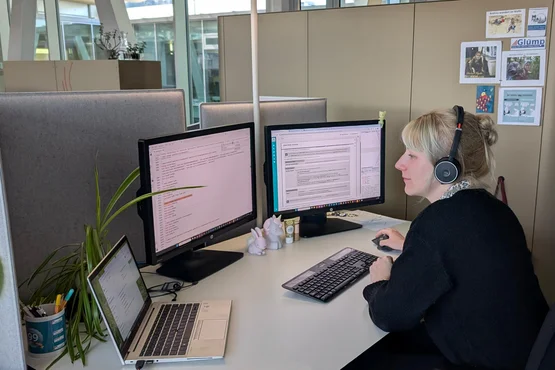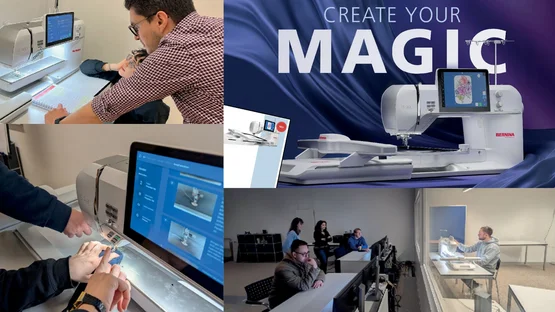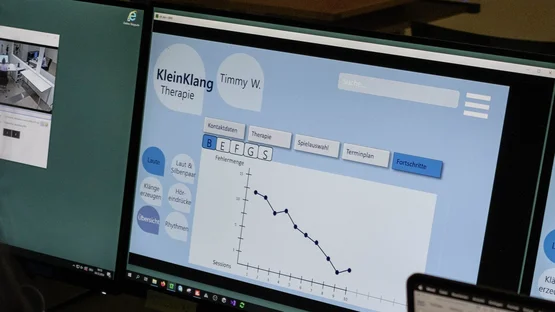BA in Multilingual Communication
In our digital and globalised world, communication between cultures and languages as well as people and technology is more important than ever. This degree programme lays the foundations for a multilingual career in which you can shape communication in a creative fashion, understand and co-develop language technologies and put them to professional use.
Whether translating and subtitling films and series, designing user-friendly technical documentation or optimising computer-assisted language processing: the BA in Multilingual Communication combines language expertise, technological expertise and creativity.
Focus areas of the program:
- Outstanding language skills in at least three languages
- Applying AI-based language technologies, integrating them into workflows and taking on an advisory role
- Designing specialised content for specific target groups and across different media
- Working with language data and terminology management
- Helping to shape trends and innovations in the language industry
Your Future Career
The BA in Multilingual Communication offers a wide range of career opportunities at national and international level, in small and large companies and in almost every industry. You will work in areas where professional multilingualism and intercultural communication are required. Typical activities in the language industry include:
- Project management in translation and localization projects
- Preparation of communication products for multilingual target groups
- Information architecture and structuring of complex content
- Subtitling and audio description for film, television, and streaming
- Technical documentation and creation of user-friendly instructions
- UX writing for digital products and user interfaces
- Co-development and adaptation of language technologies
- Consulting on AI-supported language solutions
- Optimization of language-based workflows in the language industry
What our graduates say
-

Technik verstehen, Sprache gestalten – ein Studium mit Mehrwert
Autorin: Kyra Jetzer Als Lilly sich damals für den Studiengang Mehrsprachige Kommunikation entschied, war ihr eines bereits klar: Sie hatte ein Faible für Bedienungsanleitungen. Während andere mit ...
-

Mit Sprachexpertise in die Technikwelt – ein Alumniporträt
Als Andrea Scheck sich für den Studiengang Mehrsprachige Kommunikation an der ZHAW entschied, dachte sie an Sprachen – nicht an Programmieren, Informatik oder Softwares. Doch der Studiengang öffnete ...
-

Berufseinstieg in die Sprachbranche – Absolvent Alessandro Accetta im Porträt
Die Sprachbranche befindet sich im Umbruch. Künstliche Intelligenz und maschinelle Übersetzung revolutionieren die Art und Weise, wie wir mit Sprache und Übersetzungen arbeiten. Für Alessandro ...
What you will study
You will acquire excellent language skills in at least three languages of study and develop the ability to mediate between languages, cultures, and contexts. At the same time, you will acquire a broad spectrum of future-oriented skills:
| Language | Technology | Human |
|---|---|---|
| Fluent in three languages, both spoken and written | Technical documentation | Accessible communication |
| Translation & Community Interpreting | Usability | Intercultural communication |
| Subtitling | Natural Language Processing | project management |
Further information about the degree programme can be found on our German-language webpages:
About the BA in Multilingual Communication
Languages of study
Programme structure
Admission requirements
Costs
Registration for our information event
How to apply
Graduation ceremonies
Choose a specialisation
Multimodal Communication
You deepen your skills in oral and written translation and familiarise yourself with various modalities, including subtitling and interpreting. You use AI-based language technologies systematically, allowing you to optimise translation processes in various fields of application.
Information Design
You specialise in preparing subject-specific information for different target groups in multiple languages. Focus is placed on usability, visual communication, user experience and testing and optimising software and apps.
Language Engineering
You gain a deep understanding of computer-assisted language processing and the development of language technologies. You learn to create information systems, work with language data and statistics and program tools to make translation processes more efficient – skills that are increasingly crucial for technical roles within the language industry.
Practical studies
The BA in Multilingual Communication combines solid theory with practical experience.
In addition to many modules in which you work on real projects with external partners, you can also spend a semester abroad, do exciting internships and even participate in research. This gives you a clear insight into the language industry while you are still studying. At events such as the IMK Forum, you will also meet experts from the industry, make contacts, and build your network for the start of your career.
Insights into our degree programme
-

Nähen in Zeiten der Digitalisierung: Usability-Testing des GUI der Nähmaschine BERNINA B 990
Praxisnahe Projekte sind ein fester Bestandteil und ein Highlight im Studiengang Mehrsprachige Kommunikation – besonders dann, wenn die Studierenden mit innovativen Unternehmen zusammenarbeiten ...
-

Mehrsprachige Kommunikation im Wandel: Neue Vertiefungen für ein zukunftssicheres Berufsfeld
Die Welt der Sprache wandelt sich rasant. Neue Technologien wie Künstliche Intelligenz und maschinelle Übersetzung haben das Berufsfeld der mehrsprachigen Kommunikation in den letzten Jahren ...
-

Zwei Welten, ein Ziel: Interdisziplinäre Zusammenarbeit in der App-Entwicklung
Was entsteht, wenn Sprachbegeisterte und Informatiker:innen zusammenarbeiten? Ein interdisziplinäres Projekt, bei dem Studierende der Mehrsprachigen Kommunikation und der Informatik gemeinsam ...
At a glance
Before the study
- Downloads: brochure (PDF 1.78 MB)
- Admission requirements: Either a Swiss higher secondary education certificate (Matura) – which may be either a Swiss general baccalaureate (in German, “gymnasiale Maturität”), a Swiss specialist baccalaureate (in German, “Fachmaturität”) or a Swiss vocational baccalaureate (in German, “Berufsmaturität”) – or an equivalent qualification from another country. Successful completion of theaptitude test is also required. Further info on admission requirements
- Admissions procedure: information on the aptitude test (PDF 142 kB)
- Application deadline: 30 April
- Tuition fees: CHF 720.- per semester + additional course-related expenses
During the study
- Programme start: Autumn
- Location: Winterthur, with the option to complete the fifth semester as a semester abroad or internship semester
- Format: full-time, part-time study is possible
- Number of credits: 180 ECTS credits
- Duration: 6 semesters (full-time), approx. 10 semesters (part-time, depending on the student’s individual profile)
- Teaching language: German and your chosen languages of study
- Legal basis: academic regulations and annex
After the study
- Title: Bachelor of Arts ZHAW in Multilingual Communication
- Graduate programmes: Master of Arts in Language and Communication and others
Admission requirements
Admission requirements
To be admitted to the programme, you will need to meet the following requirements:
- You will need to be in possession of either a Swiss higher secondary education certificate (Matura) – which may be either a Swiss general baccalaureate (in German, “gymnasiale Maturität”), a Swiss specialist baccalaureate (in German, “Fachmaturität”) or a Swiss vocational baccalaureate (in German, “Berufsmaturität”) – or an equivalent qualification from another country.
- You will need to successfully complete our aptitude test.
You are not required to demonstrate practical professional experience (e.g. a year of work experience) in order to be admitted to the BA in Multilingual Communication.
Aptitude test
The aptitude test consists of several language tests.
You will be tested in the languages you intend to study, i.e. your language (mother tongue) and at least two foreign languages. You may take tests in a greater number of languages than can be studied in the foundation course. The level of proficiency required for admission is equivalent to an above-average baccalaureate grade in your main language and approximately C1 under the Common European Reference Framework in your foreign languages.
Passing grades and language combinations
To pass the aptitude test, you must pass each unit (approx. 60% pass mark). If you pass the aptitude test, you are entitled to enrol in the degree programme in the year you take the test or in the year thereafter. If you do not pass the aptitude test at the first sitting, you may resit the test one more time, the resit being no earlier than one year after the first attempt. You must only resit those units of the test which were failed.
As a rule, you study the combination of languages you entered on your application form. When the grade achieved in a language test is only just sufficient, we reserve the right to determine the language combination on the basis of the admissions assessment results (with the stronger foreign language being the first foreign language and the weaker foreign language the second one).
Exemptions
You must sit a language test in your main language. No exemption from this requirement can be granted for any candidate.
If you have a recognised language certificate at level C2 in a foreign language, you can be granted a exemption from the test in that language provided the certificate was awarded no more than two years before the date of your application.
German as a foreign language
Goethe-Zertifikat C2: Grosses Deutsches Sprachdiplom
English as a foreign language
Certificate of Advanced English, Grade A
Certificate of Proficiency in English
TOEFL (Internet-based), score: 115
IELTS, Band 8.0
French as a foreign language
Diplôme Approfondi de Langue Française DALF C2
Italian as a foreign language
CELI 5 Certificato di conoscenza della Lingua Italiana
PLIDA C2
Spanish as a foreign language
Diploma Superior de Español DELE C2
How to prepare for the aptitude test
Depending on your language level and the type of learner tha you are, you can prepare in different ways for the language tests. We recommend that you spend time in the countries where the relevant languages are spoken, either taking a language courses, doing an internship and/or working. We also recommend that you consciously and actively use the language in the run-up to the language tests and consume content in your chosen languages via television, newspapers and podcasts.
The following demo versions of the language tests give an idea of the level required:
Dates and deadlines
The deadline for applications is 30 April. The aptitude tests take place in May during calendar week 21 (overview of dates and deadlines). The exact dates will be communicated to you in person once your application has been received. All language tests are usually completed on a single day. If you take tests in more than one main language or more than two foreign languages, you may be asked to attend on a second day.
For prospective students based outside Switzerland
Enrolling on a regular degree programme at the ZHAW with a foreign university entrance qualification
If you are in possession of a foreign qualification (e.g. Abitur or International Baccalaureate), obtained either in Switzerland or abroad that allows you access to higher education, please submit the documents requested by the academic office responsible for the degree programme you have chosen so that your qualification can be checked for equivalency. This equivalency recognition process follows the Guidelines on Equivalency Recognition for Bachelors Degree Programmes and takes place after your application has been submitted. If you have any questions, please contact the academic office. There are no quotas on international students.